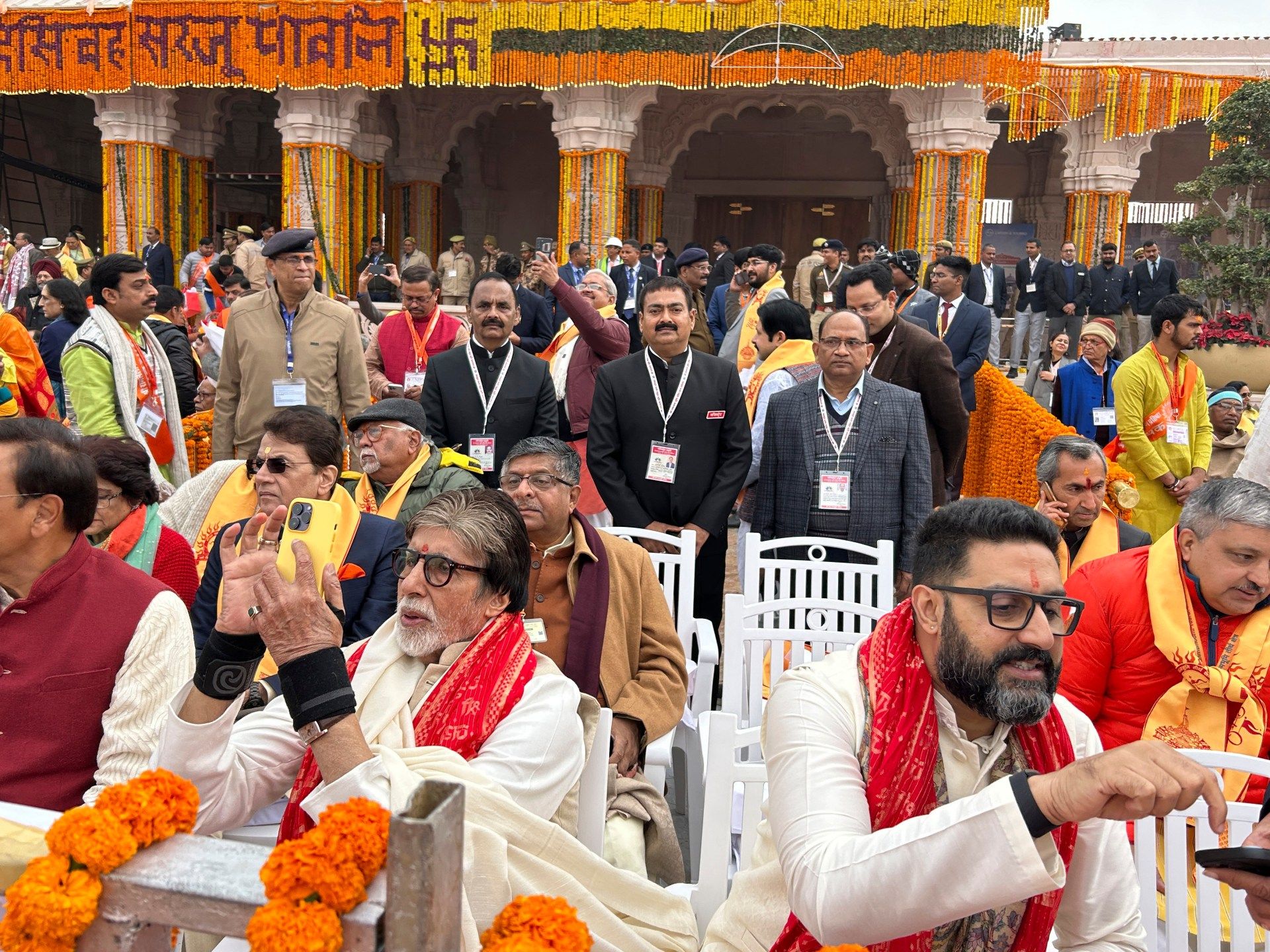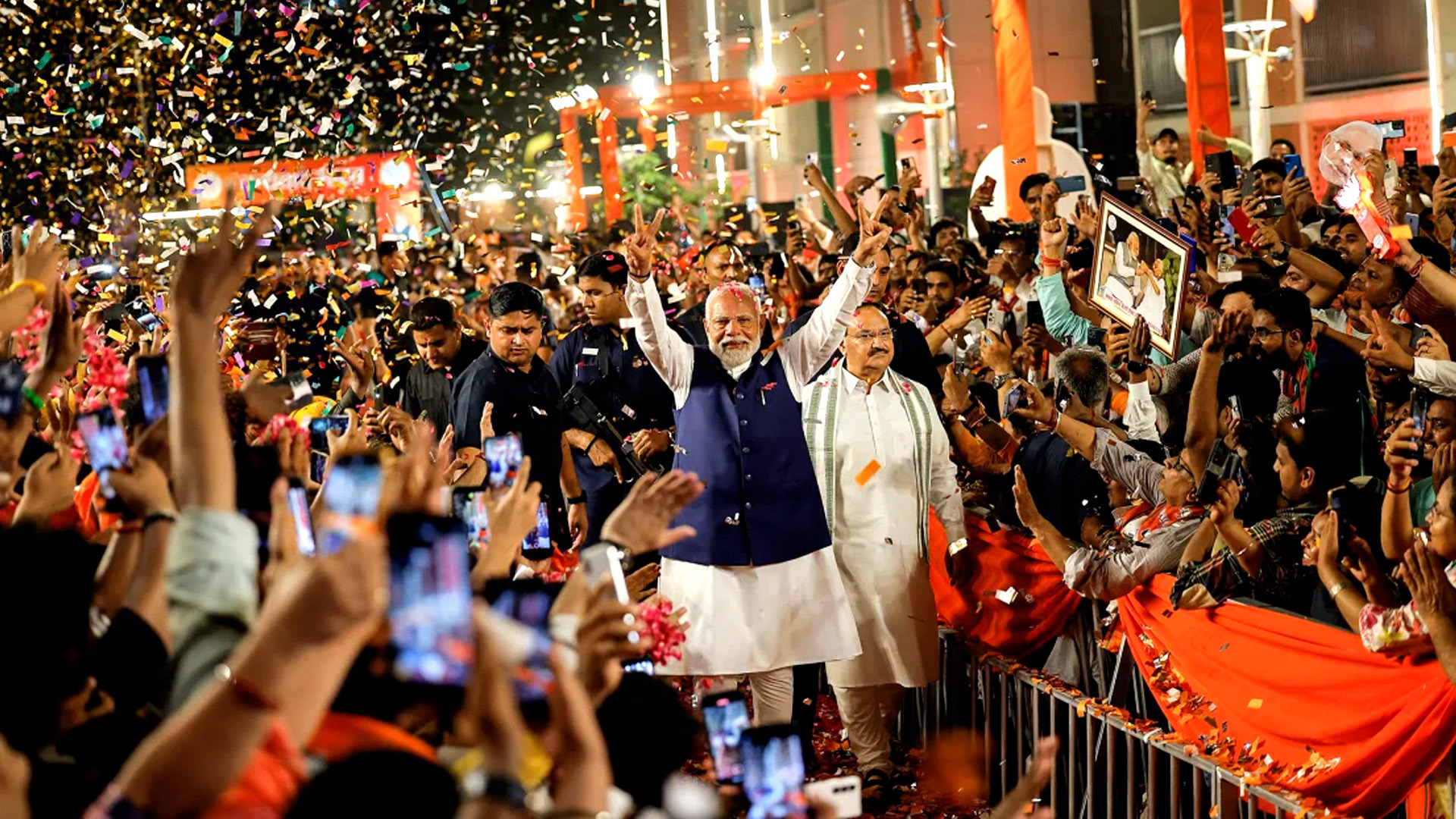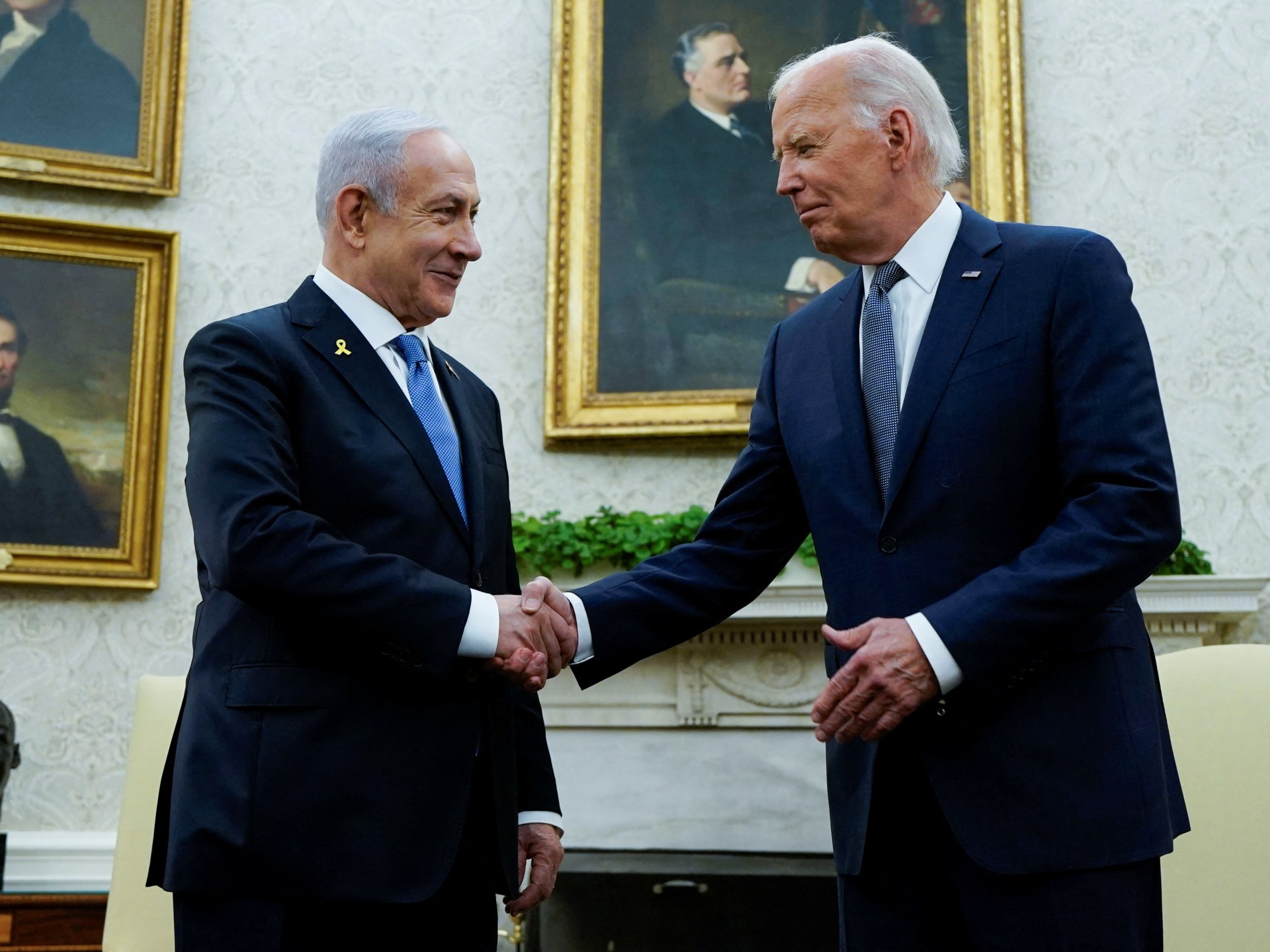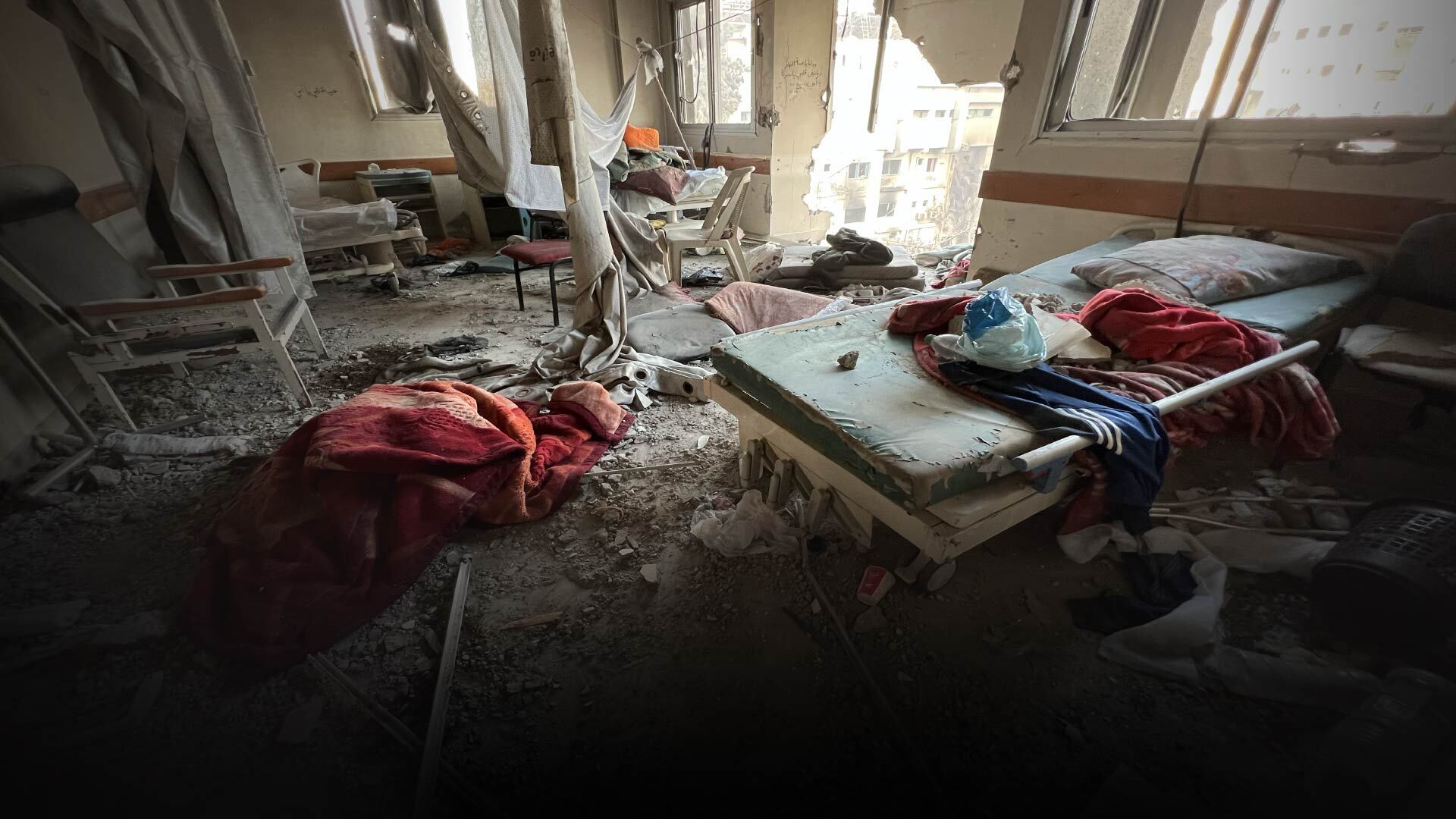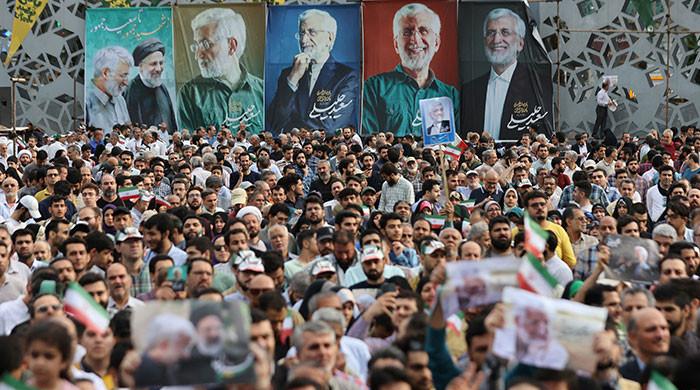Mumbai, India – A police officer with a grimace, looking at the camera, declares her intention to publicly shoot dead “leftists” while attacking “left-liberal pseudo-intellectuals” as well as students at the Jawaharlal Nehru University (JNU), a space left-leaning university in the crosshairs of the Modi government.
Men in hats, the images interspersed with bloody violence, declare that Rohingya Muslims will soon displace Hindus and make up half of India's population, while a distraught Hindu woman fighting the men says she wants to meet the prime minister. Narendra Modi.
A biopic about Hindu nationalist ideologue Vinayak Damodar Savarkar from the early 20th century has a voiceover insisting that India would have freed itself from British colonial rule more than three decades earlier, if not for Mahatma Gandhi.
These are scenes from upcoming Hindi films scheduled to release in the coming weeks.
As India's nearly one billion voters prepare to elect their national government in general elections to be held between March and May, Modi and his ruling Bharatiya Janata Party (BJP) are receiving campaign support from an unusual ally: cinema.
A slew of new films, coinciding with elections and often directed by major production houses, are based on stories that openly promote Modi and his government's policies or take aim at rival politicians. Not even national icons like Gandhi or top universities like JNU are spared: the institution has long been a bastion of left-leaning liberal education, often antagonistic to the BJP's Hindu majoritarianism.
Many of these stories peddle Islamophobic conspiracies that commonly circulate among Hindu right-wing networks that are aligned with the BJP's political agenda. At least 10 such films have recently been released or are about to hit theaters and television this election season.
“This is part of a broader attempt to 'take over' the Hindi film industry, just as other forms of popular culture have been infiltrated,” said Ira Bhaskar, a retired professor of film studies at JNU who was also a member of the group. the country's censorship board until 2015. Bhaskar was referring to the growing Hindu nationalist narratives found in pop culture forms such as music, poetry and books.
The latest films include biographical films that glorify the controversial legacies of Hindu majority heroes and BJP leaders. Savarkar, a controversial anti-colonial Hindu nationalist, advocated the rape of Muslim women as a form of retribution for historical wrongs.
Two of the upcoming films, Accident or Conspiracy: Godhra and The Sabarmati Report, claim to “reveal” the “true story” behind the 2002 Godhra train fire, where 59 Hindu pilgrims died in a fire that sparked the fighting. anti-muslim. riots orchestrated by right-wing Hindu groups that claimed more than 1,000 lives, mostly Muslims. The riots occurred when Modi was the chief minister of the state.
Another film, Aakhir Palaayan Kab Tak? (How Long Will We Have to Flee?), shows a Hindu “exodus” supposedly due to Muslims. Then there is Razakar, a multilingual statement on what it calls the “silent genocide” of Hindus in Hyderabad by Razakars, a volunteer paramilitary force that inflicted mass violence before and after India's independence in 1947. The film was produced by a BJP leader.
In late February, Modi himself praised Article 370, a newly released film that praises his government's controversial decision to strip Indian-administered Jammu and Kashmir of its special status and statehood, while placing hundreds under house arrest. and imposes blockades in the region. Film critics have called the film a “showbiz piece” and a “thinly veiled propaganda film” in favor of the Modi government, while treating its critics and opposition leaders with “mockery”.
Bhaskar said the new films were “clear propaganda, there is no doubt about that.”
A growing trend
The rise of such films builds on a pattern that was also seen before the 2019 elections, when Modi returned to power for the second time. On the eve of that vote, a handful of films attempted to bolster the BJP's popularity.
Some attempted to take down critics of the ruling party, such as Accidental Prime Minister, a harsh critic of Modi's predecessor, Manmohan Singh. Others stoked jingoism, such as Uri: The Surgical Strike, which recreated military strikes that Indian forces carried out inside Pakistan-controlled Kashmir in retaliation for a terrorist attack on an Indian military camp in the Uri region of Kashmir in September 2016. The film ended with a scene. of a pleased-looking, Modi-like prime minister. Both films were released the same week, days before the elections.
But Bhaskar said that while the trend is not new, it has grown since 2014, when Modi came to power, starting with the change in the way the Indian film industry approached historical representations.
“In recent years, we have seen a change in the portrayal of Muslim rulers, who are now all portrayed as barbarians and destroyers of temples,” Bhaskar said. “This was also propaganda, although in a not so direct way, where the message was: Muslims do not belong to India, they were invaders.”
These positions align with the publicly stated goals of the Hindu right-wing ecosystem to purge Mughal history from the public consciousness.
These types of films have, in the past, faced accusations of amplifying social divisions and hate speech. At screenings of films such as The Kashmir Files, which depicts the exodus of Kashmiri Pandits in the 1990s, audiences often, at the end of the film, stood up and called for violence against Muslims and advocated their boycott.
Another film, The Kerala Story, widely criticized for inaccuracies in depicting an alleged ISIL/ISIS conspiracy to lure Christian and Hindu girls to join the group, helped ignite social tensions between communities, leading to violence in the Akola region, western India. in Maharastra.
Fear and opportunism
Film industry insiders attribute this new genre of films to a mix of restlessness, opportunism and a helpful nudge from the establishment.
Several industry experts this writer contacted declined to speak on the record for fear of retaliation.
Bollywood, in recent years, has frequently been the victim of high-decibel campaigns, often backed by BJP leaders, from boycotting films to calling for their ban. Hindu right-wing groups have often attacked films and shows for broadcasting “anti-Hindu” content.
In 2021, BJP leaders had called for the arrest of the director and officials of the streaming service Amazon Prime over a web show Tandav because it had scenes that protesters said were defamatory towards Hindu gods. Police complaints seeking their arrest were filed in six different cities before the country's highest court suspended them.
Many experts said these cases had had a “chilling effect” on other creators. “Ideas are often rejected or altered at the pre-production stage, because filmmakers are now constantly self-censoring and anticipating the problems the content could cause in the current political climate,” said one film producer, requesting anonymity.
Others, however, believe that these films are not only the result of that fear, but also a tinge of opportunism. A Mumbai-based director, who had been asked to make a film that aligned with a pro-Hindu majority agenda, said filmmakers are often tempted to “cash in” on the current political atmosphere. “With the success of some such films in the past, many filmmakers are now tempted to try to appease the dominant ideology in the hope of also finding commercial success,” the director said.
Others echoed this sentiment. Speaking to Al Jazeera, a popular Hindi film actor revealed how a streaming service drastically altered a show he was a part of, based on the life of a historical figure, to present him as a Hindu legend taking on Muslim invaders. “The streaming service thought that 'repositioning' of the character would make it a good seller,” the actor said. The show, the actor said, did “decently well” among rural audiences.
And when films pander to the ideology of the ruling party, they often receive a handout from the government. In the past, controversial films like The Kashmir Files and The Kerala Story have been rewarded by BJP governments: they were exempted from taxes. BJP units also organized free screenings of these films, helping them reach a wider audience. Modi publicly praised both films, giving them greater legitimacy, and insisted that films be made about the state of emergency imposed by Prime Minister Indira Gandhi in 1975 – during which several fundamental rights were suspended – as well as the partition of India. in 1947.
Al Jazeera sought comment from Sudipto Sen, director of The Kerala Story. Sen said he would respond, but he had not done so at the time of publication.
Others, like National Award-winning filmmaker R Balakrishnan, however, believe that the rise of such films reflects a demand for such content from the audience. “Suddenly, people are interested in incidents that they don't know about. There is interest in political films and historical films based on incidents,” he stated.
The danger, he added, was that this curiosity was being “subverted” as the filmmakers did not adequately investigate their subjects. “When making a political film about an event or incident, the onus is on the filmmaker to do the research and make it accurate. “If films are used to subvert the truth and use it for other purposes, it deprives people of the knowledge of what really happened there,” he stated.
Here to stay?
Balakrishnan, the director, said such “weak films” would be limited to a few filmmakers. “Some are trying to ride the wave, but this will not become a widespread phenomenon. After all, audiences don’t want to watch political movies every day.”
Others, however, point to a newer trend: that of conventional films, starring celebrities, which also serve propaganda purposes. Fighter, a film released in January, starring lead actors Hrithik Roshan and Deepika Padukone, had a character playing Prime Minister Modi delivering bombastic one-liners, insisting that it was time to show Pakistan who was the “boss”, before decide to jump into the air. strikes against the neighbor in 2019.
Bhaskar, the retired JNU professor, said this was a sign that the trend was only going to deepen. “This is no longer episodic or linked to any event like polls,” Bhaskar said. If anything, he added, the scale of these types of films will now grow. “Now we will see how big-budget, highly publicized films are made for propaganda purposes.”

